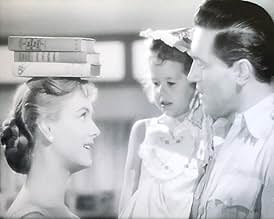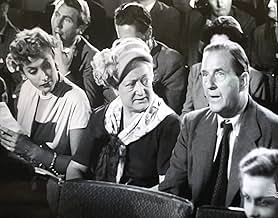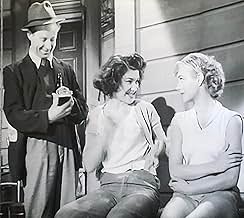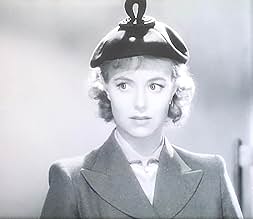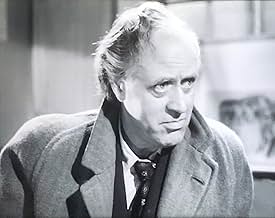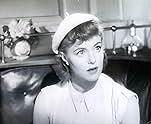अपनी भाषा में प्लॉट जोड़ेंAn unsophisticated and impressionable young girl finds herself in trouble after winning a beauty pageant.An unsophisticated and impressionable young girl finds herself in trouble after winning a beauty pageant.An unsophisticated and impressionable young girl finds herself in trouble after winning a beauty pageant.
Eddie Leslie
- Comic
- (as Eddy Leslie)
फ़ीचर्ड समीक्षाएं
It is difficult to believe that with the talent both behind and in front of the camera that this film could be such a misfire.It clearly attempts to be a satire on beauty competitions and the film industry,but misses just about every target that it aims at.As one other reviewer has mentioned she is reminiscent of Ruby Keeler ie talentless.She is just totally out of her depth.Dennis Price is the nominal star of this film,but echoing is spiraling down career he only appears for about 20 minutes.He just had to appear in what ever he was offered he was desperately short of money.However there are 2 standout female performances both which show star potential.Diana Dors is great as usual and playing a sister of Proudfoot is the great Kay Kendall.just a couple of years away from stardom in Genevieve.
It may interest people to know that appearing in the film uncredited as a contestant in a beauty contest is Ruth Ellis.
On July 13th 1955 she became the last woman hanged for murder in Great Britain. In a jealous rage the 28 year old night-club manageress fired six shots at her 24 year old lover David Blakely outside the Magdala Pub in Hampstead, London. Two bullets missed, one piercing the hand of a passer-by; two hit him in the back, one in the thigh and one in the left arm. He died instantly.
When sentenced to death the only thing she said was 'Thanks'.
The female star of the film was Diana Dors. Her greatest ever screen performance was in 'Yeild to the Night' the harrowing story of murderess Mary Price Hilton a character based on Ruth Ellis.
Consultant on the film was executioner Albert Pierrepoint - the man who hanged Ruth Ellis.
On July 13th 1955 she became the last woman hanged for murder in Great Britain. In a jealous rage the 28 year old night-club manageress fired six shots at her 24 year old lover David Blakely outside the Magdala Pub in Hampstead, London. Two bullets missed, one piercing the hand of a passer-by; two hit him in the back, one in the thigh and one in the left arm. He died instantly.
When sentenced to death the only thing she said was 'Thanks'.
The female star of the film was Diana Dors. Her greatest ever screen performance was in 'Yeild to the Night' the harrowing story of murderess Mary Price Hilton a character based on Ruth Ellis.
Consultant on the film was executioner Albert Pierrepoint - the man who hanged Ruth Ellis.
The movie industry turns out one of those "It's not easy in the moom pitcher business" movies every few years, like A STAR IS BORN, and this Launder-Gilliat production, made during the slide of the 1950s is their contribution to the field. Pauline Stroud is hectored into taking part into a local beauty pageant. This leads to a glamour competition, which she wins, when Diana Dors doesn't want to take time out from her more profitable life to accept the prize of a 3-month studio contract. Miss Stroud thinks she is on the road to stardom.... but the industry is full of chiselers and ineffectual nice guys down on their luck, while she is too mousy and moral to do more than flounder and sink.
There are plenty of interesting players, from Dennis Price and Miss Dors, to surprising unbilled cameos like Alastair Sim and Googie Withers; the beauty contestants are starlets who would become prominent over the next couple of decades, like Kay Kendall and Joan Collins. It's the dourest of comedies that could manage a general release, while never releasing its hold on the audience's attention.
There are plenty of interesting players, from Dennis Price and Miss Dors, to surprising unbilled cameos like Alastair Sim and Googie Withers; the beauty contestants are starlets who would become prominent over the next couple of decades, like Kay Kendall and Joan Collins. It's the dourest of comedies that could manage a general release, while never releasing its hold on the audience's attention.
Marjorie Clark, a working-class girl from an industrial Midlands town, becomes a local celebrity when she is chosen to play Lady Godiva in a local pageant. Much against the wishes of her puritanical old father and her possessive boyfriend Johnny she enters a beauty contest, and accidentally wins after the organiser's attempt to rig the contest in favour of his girlfriend misfires. Marjorie becomes a national celebrity and for a time enjoys success as a model, but has less success when she tries to conquer the world of showbiz despite having very little talent for acting, singing or dancing.
In Britain the film was known as "Lady Godiva Rides Again", but was released in the United States as "Bikini Baby", in a particularly dishonest piece of marketing. The poster designed for the American market proclaimed in huge letters "starring Diana Dors" accompanied by a picture of Dors in a bikini. Beneath, in smaller letters, it mentioned Kay Kendall and Stanley Holloway, and "dozens of beauty queens and artists' models!", but made no mention of the film's actual leading lady Pauline Stroud, who plays Marjorie. Contrary to the impression given by the poster, Dors plays a secondary character who appears only in a couple of scenes.
The marketing may have been dishonest, but I can see why it was done. Dors, oozing sex appeal and charisma from every pore, steals every scene she is in. Her character Dolores August- she who should have won the contest but didn't- is the sort of girl for whom the expression "fur coat and no knickers" could have been invented. She will drop her knickers for any man who might advance her career, and would sell her soul for a fur coat. It is no surprise that in Britain Dors became the leading sex symbol of the fifties. (Internationally her success was to be more limited).
Some films on the well-worn theme of "it's grim in showbiz" can be serious, even tragic, in tone, but this one is mainly a light-hearted comedy. There is a good deal of satire at the expense of the entertainment industry, and not just crooked beauty contests. The opening scene, showing Marjorie's home town on a rain-sodden Sunday afternoon, seems to be a parody of the then-popular "kitchen sink" social-realist genre, possibly inspired by one of the best-known films in that genre, Robert Hamer's "It Always Rains on Sunday". The "glamour school" which Marjorie attends seems to have been a dart aimed at Rank's "charm school", a training-ground for young actresses which concentrated more on looks and deportment than on acting ability. Dennis Price appears as Simon Abbott, a smoothly lecherous matinee idol who tries to get every girl he meets into bed with him. (Several real-life matinee idols might have recognised themselves in this portrayal). There is an amusing cameo from Alastair Sim as Hawtrey Mewington, an ageing, down-on-his-luck film producer, forever bemoaning the (alleged) fact that the once-great British film industry was being ruined by competition from television and Hollywood. (Memo to HM Government: Do more to support British cinema!)
Dors, Price and Sim are not the only big-name stars who appear in small roles. Holloway plays Marjorie's father and Kendall her sister. George Cole is Johnny, Sid James (not as big a star in 1951 as he was to become later) appears briefly as a sleazy impresario, and if you blink you might miss Dora Bryan and Googie Withers. Trevor Howard makes an uncredited as appearance as a theatre patron. This is, in fact, the sort of film in which all the small parts are played by big names and the only big part by a small name. Stroud never went on to become a major star, which does not really surprise me. She was pretty but lacked Dors's charisma, and on the evidence of this film lacked talent as well. (She also sounds too posh for a working-class Midlands girl, but is not alone in that. In the scenes set in the Midlands all the female characters speak with genteel RP accents and the male ones sound like Cockneys). The film as a whole, in fact, is quite amusing and provides us with an interesting look at British life in the early fifties. With a stronger actress in the lead, however, it could have been a lot better. 6/10
There are two strange coincidences about this film, both involving Dors. The contestants at the beauty contest include, besides Stroud and Dors, not only a teenage Joan Collins in her film debut but also a then-unknown model and actress named Ruth Ellis. In 1955 Ellis was to become famous, but sadly not for her acting or modelling. She was sentenced to death after shooting dead her abusive boyfriend, becoming the last woman to be executed in Britain. When a fictionalised version of Ellis's story, "Yield to the Night", was made soon afterwards, Dors, who had befriended Ellis during the making of "Lady Godiva Rides Again", was cast in the leading role.
In one scene there is a scuffle between Johnny and Abbott, who has cast his lustful eye on Marjorie, ending with Abbott falling into the river. As a result of the ensuing bad publicity, the film studio who have signed Marjorie up as a starlet sack her, invoking a "morality clause" in her contract. This closely parallels what was to happen to Dors during her ill-fated attempt to conquer Hollywood a few years later. A scuffle between her husband Dennis Hamilton and a photographer ended with several people falling into a swimming pool. As a result of the ensuing bad publicity, Dors's studio sacked her, invoking a "morality clause" in her contract.
In Britain the film was known as "Lady Godiva Rides Again", but was released in the United States as "Bikini Baby", in a particularly dishonest piece of marketing. The poster designed for the American market proclaimed in huge letters "starring Diana Dors" accompanied by a picture of Dors in a bikini. Beneath, in smaller letters, it mentioned Kay Kendall and Stanley Holloway, and "dozens of beauty queens and artists' models!", but made no mention of the film's actual leading lady Pauline Stroud, who plays Marjorie. Contrary to the impression given by the poster, Dors plays a secondary character who appears only in a couple of scenes.
The marketing may have been dishonest, but I can see why it was done. Dors, oozing sex appeal and charisma from every pore, steals every scene she is in. Her character Dolores August- she who should have won the contest but didn't- is the sort of girl for whom the expression "fur coat and no knickers" could have been invented. She will drop her knickers for any man who might advance her career, and would sell her soul for a fur coat. It is no surprise that in Britain Dors became the leading sex symbol of the fifties. (Internationally her success was to be more limited).
Some films on the well-worn theme of "it's grim in showbiz" can be serious, even tragic, in tone, but this one is mainly a light-hearted comedy. There is a good deal of satire at the expense of the entertainment industry, and not just crooked beauty contests. The opening scene, showing Marjorie's home town on a rain-sodden Sunday afternoon, seems to be a parody of the then-popular "kitchen sink" social-realist genre, possibly inspired by one of the best-known films in that genre, Robert Hamer's "It Always Rains on Sunday". The "glamour school" which Marjorie attends seems to have been a dart aimed at Rank's "charm school", a training-ground for young actresses which concentrated more on looks and deportment than on acting ability. Dennis Price appears as Simon Abbott, a smoothly lecherous matinee idol who tries to get every girl he meets into bed with him. (Several real-life matinee idols might have recognised themselves in this portrayal). There is an amusing cameo from Alastair Sim as Hawtrey Mewington, an ageing, down-on-his-luck film producer, forever bemoaning the (alleged) fact that the once-great British film industry was being ruined by competition from television and Hollywood. (Memo to HM Government: Do more to support British cinema!)
Dors, Price and Sim are not the only big-name stars who appear in small roles. Holloway plays Marjorie's father and Kendall her sister. George Cole is Johnny, Sid James (not as big a star in 1951 as he was to become later) appears briefly as a sleazy impresario, and if you blink you might miss Dora Bryan and Googie Withers. Trevor Howard makes an uncredited as appearance as a theatre patron. This is, in fact, the sort of film in which all the small parts are played by big names and the only big part by a small name. Stroud never went on to become a major star, which does not really surprise me. She was pretty but lacked Dors's charisma, and on the evidence of this film lacked talent as well. (She also sounds too posh for a working-class Midlands girl, but is not alone in that. In the scenes set in the Midlands all the female characters speak with genteel RP accents and the male ones sound like Cockneys). The film as a whole, in fact, is quite amusing and provides us with an interesting look at British life in the early fifties. With a stronger actress in the lead, however, it could have been a lot better. 6/10
There are two strange coincidences about this film, both involving Dors. The contestants at the beauty contest include, besides Stroud and Dors, not only a teenage Joan Collins in her film debut but also a then-unknown model and actress named Ruth Ellis. In 1955 Ellis was to become famous, but sadly not for her acting or modelling. She was sentenced to death after shooting dead her abusive boyfriend, becoming the last woman to be executed in Britain. When a fictionalised version of Ellis's story, "Yield to the Night", was made soon afterwards, Dors, who had befriended Ellis during the making of "Lady Godiva Rides Again", was cast in the leading role.
In one scene there is a scuffle between Johnny and Abbott, who has cast his lustful eye on Marjorie, ending with Abbott falling into the river. As a result of the ensuing bad publicity, the film studio who have signed Marjorie up as a starlet sack her, invoking a "morality clause" in her contract. This closely parallels what was to happen to Dors during her ill-fated attempt to conquer Hollywood a few years later. A scuffle between her husband Dennis Hamilton and a photographer ended with several people falling into a swimming pool. As a result of the ensuing bad publicity, Dors's studio sacked her, invoking a "morality clause" in her contract.
I have read all the other user comments after watching this film billed as "Lady Godiva Rides Again" but shown on IMDb.com as "Bikini Babe" (1951) on London Live TV network today.My main interest was seeing an early screen appearance of Bernadette O'Farrell playing a minor part.She was mostly known for playing the maid Marion in the 1950s TV series 1&2 "The Adventures of Robin Hood" which starred Richard Greene and for playing a Miss Harper in "The Happiest Days of your Life" (1951).
I have remarked in my previous reviews of the aforementioned adventure series what a startling facial resemblance she bore to the late Jennifer Jones, all of whose films I possess on video &/or DVD.The lead who played the "wannabe" actress and Diana Dors I never found attractive on screen.It was a pity Bernadette had to marry Frank Launder and give up her film career so early as I would have liked to have seen her in other roles. Barely adequate at 4/10 and what a let down for the audience as we don't see Lady Godiva riding her white horse on stage naked even though at the time the lord Chancellor insisted at the time nude models had to kept perfectly static on stage!!
I have remarked in my previous reviews of the aforementioned adventure series what a startling facial resemblance she bore to the late Jennifer Jones, all of whose films I possess on video &/or DVD.The lead who played the "wannabe" actress and Diana Dors I never found attractive on screen.It was a pity Bernadette had to marry Frank Launder and give up her film career so early as I would have liked to have seen her in other roles. Barely adequate at 4/10 and what a let down for the audience as we don't see Lady Godiva riding her white horse on stage naked even though at the time the lord Chancellor insisted at the time nude models had to kept perfectly static on stage!!
क्या आपको पता है
- ट्रिवियाOne of the Beauty Queen contestants is a dark-haired Ruth Ellis, later to become infamous as the last woman hanged in Britain for murder and the subject of the movie Dance with a Stranger (1985).
- गूफ़When Mrs. Clark complains about serving customers, while leaving her ironing, a shadow of the boom microphone is visible at the top of screen.
- भाव
Hawtrey Murington - Optimum Films: The casting director is no longer with us. Murington alone remains, and he faces you.
Marjorie Clark: You mean you're "the" Mr. Murington?
Hawtrey Murington - Optimum Films: No longer "the" - - "that."
- कनेक्शनFeatured in Those British Faces: A Tribute to Stanley Holloway 1890-1982 (1993)
- साउंडट्रैकHow Long Is Always?
Written by Leo Towers and Frankie Russell
टॉप पसंद
रेटिंग देने के लिए साइन-इन करें और वैयक्तिकृत सुझावों के लिए वॉचलिस्ट करें
- How long is Bikini Baby?Alexa द्वारा संचालित
विवरण
- रिलीज़ की तारीख़
- कंट्री ऑफ़ ओरिजिन
- भाषा
- इस रूप में भी जाना जाता है
- Bikini Baby
- फ़िल्माने की जगहें
- The Leas Cliff Hall, Folkestone, केंट, इंग्लैंड, यूनाइटेड किंगडम(setting of the Fascination Soap beauty pageant.)
- उत्पादन कंपनी
- IMDbPro पर और कंपनी क्रेडिट देखें
- चलने की अवधि1 घंटा 38 मिनट
- रंग
- ध्वनि मिश्रण
- पक्ष अनुपात
- 1.37 : 1
इस पेज में योगदान दें
किसी बदलाव का सुझाव दें या अनुपलब्ध कॉन्टेंट जोड़ें

टॉप गैप
By what name was Lady Godiva Rides Again (1951) officially released in Canada in English?
जवाब
